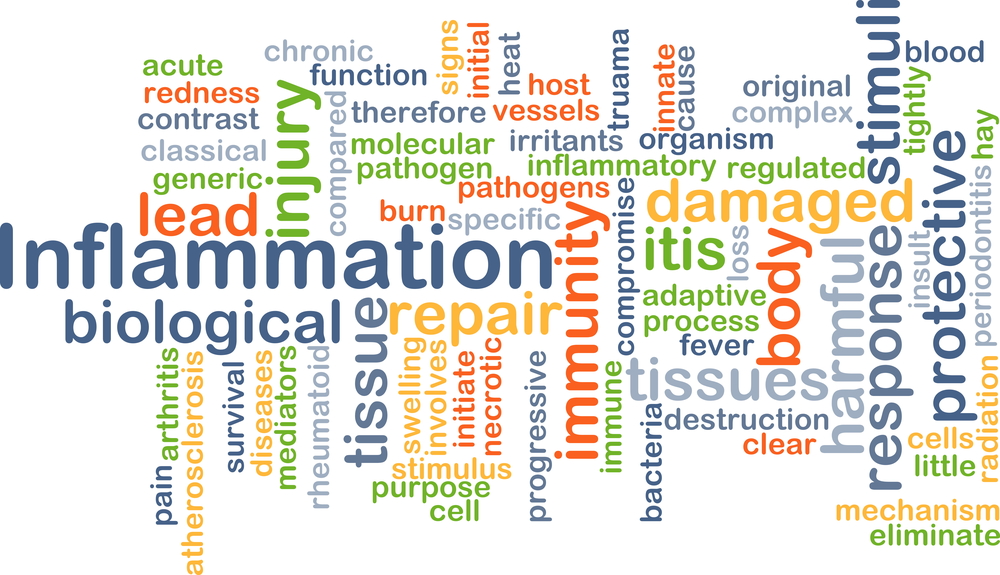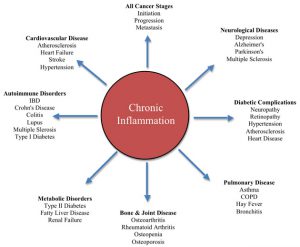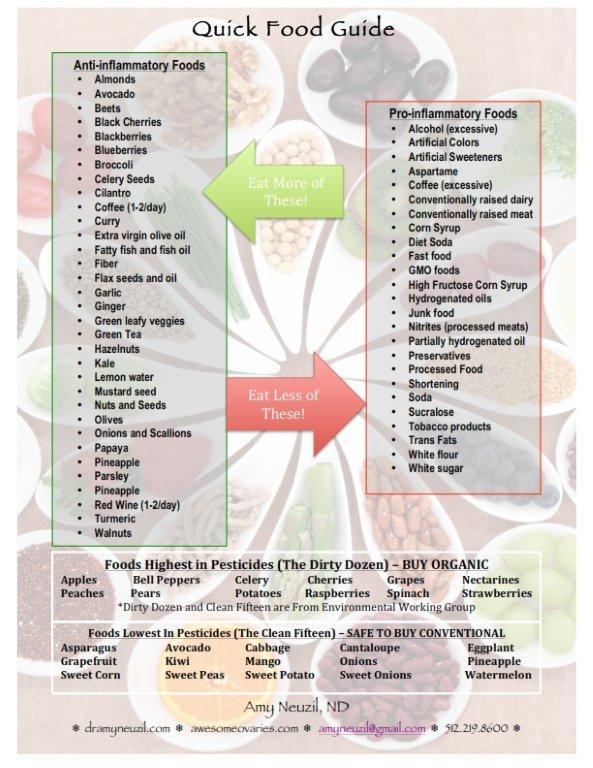 Inflammation is a normal part of the body’s immune response; without it, we couldn’t heal. But when it’s out of control—as in rheumatoid arthritis—it can damage the body. Plus, it’s known to play a role in obesity, heart disease, all kinds of neurological disorders, and cancer.
Inflammation is a normal part of the body’s immune response; without it, we couldn’t heal. But when it’s out of control—as in rheumatoid arthritis—it can damage the body. Plus, it’s known to play a role in obesity, heart disease, all kinds of neurological disorders, and cancer.
So why do we get inflammation, why is it harmful, and what are some tips on how to reduce inflammation in the body?
Types of Inflammation
Inflammation is normal for many things that happen to us. A cut or abrasion, a strained or pulled muscle, a bump on the arm or leg – all of these are normal and temporary. We know when our immune system is being called to action because we experience heat, swelling, redness, and pain.
But there is another type of inflammation that remains with us every day, some days worse than others. And that’s “chronic inflammation.”
Chronic Inflammation can come from a variety of sources both psychological and physical. But more importantly, because it is Chronic, it can become the root source of many diseases that will surface later and sometimes too late to effectively counteract.
Causes of Chronic Inflammation
Unlike an injury, Chronic Inflammation slowly creeps up on you so that you may think it’s simply the symptoms of aging. Stiffness of muscles, minor aches and pains in the stomach or organs, headaches, indigestion, hair loss, memory loss, brain fog, painful joints, foot pains, back pains, changes in eyesight, changes in hearing, cancer, skin conditions, high blood pressure, diabetes, bronchitis, arthritis, pre-mature aging, and a list of symptoms just to long to attempt.
And the secondary affects of Chronic Inflammation are very subtle. By “Secondary” I mean that it can cause more subtle issues such as not digesting your food properly and therefore reducing your vitamin intake which then in turn affects many other bodily symptoms.
Here are a list of common, long term, low-level causes…
- Bacterial, viral, and fungal infections in the stomach or gut
- Low-grade food allergies/sensitivities
- An imbalance of bacteria and fungi in your gastrointestinal tract
- Stress
- Toxicity
- Diet and Lifestyle
Types of Stress in More Detail
- Bacterial, viral, and fungal infections in the stomach or gut – H Pylori is an example that is present in 50% of adults over 60. It can cause a variety of ailments including ulcers and even stress.
- Low-grade food allergies/sensitivities – these are barely noticeable but they tend to build up over time as you eat more and more of the primary foods you consume and your gut leaks a slight amount of protein into your bloodstream causing a gradual immune reaction. Having proteins from your favorite foods such as bread, milk, and sugar in your bloodstream means you’re constantly reacting and triggering your immune system.
- An imbalance of bacteria and fungi in your gastrointestinal tract – you have more bacteria in your gut than cells in your entire body. The primary location of your immune system is your gut. Early exposure to antibiotics as well as continued exposure to antibiotics in foods such as beef, chicken, eggs, and dairy products, and hormonal exposures such as the high levels of estrogen in milk have damaged the good bacteria in our gut and left the more resilient bad bacteria. The good bacteria likes roughage, fiber, and vegetables. The bad bacteria says, “Bring on the sugar, grains, carbs, etc.
- Stress – Stress comes in different packages – psychological, physical, and emotional stress raises the level of cortisol, and creates inflammation. You can tell if you have more than your share of cortisol because you’ll notice you’ve developed a bulge around your middle (if you are male) or more than your share of fat there and everywhere if you are female. Belly Fat is the key symptom and in the longer term this fat deposited around your organs is not doing you any good. And by the way, fat is not a dead tissue as most believe. Fat is another type of organ capable of producing hormones and distributing to the body – and guess what those hormones do? They increase inflammation.
- Toxicity – over time we absorb toxins and heavy metals such as mercury from our food, and from our environment in general. These in turn generate inflammation.
- Diet and Lifestyle – too much sugar, protein, or the wrong kinds of fat in your diet, chronic dehydration, not enough exercise, and lack of sleep are just a few of the elements of your lifestyle that can contribute to Chronic Inflammation.
Knowledge is Power but What to Do Next?
You could spend some significant time trying to guess which of these causes might be the culprit. A functional medicine doctor could help you run tests and isolate the causes. There can often be several so simply experimenting with various foods doesn’t always lead you to success. The older you are, the more likely you have multiple causes of inflammation.
One of the places that people generally start experimenting is with their food. It may be one of the easiest areas to change quickly. And if you’re over 50, it’s generally a safe bet that you have developed at least some mild sensitivities to certain foods that you eat most – dairy, bread/grains, beef or chicken, etc.

This food guide gives some excellent guidelines on how to re-think your diet to eliminate more of the inflammation causing foods. Not only does it deal with food types, but it also gives you hints on those foods that will have the highest level of toxins if not purchased organic.
If you want to get the big hits first then here’s what I recommend…
- stop drinking sodas, juices, or any kind of drink with sugar or sweetener of any kind – don’t kid yourself – the artificial sweeteners are toxic and will cause cancer faster than sugar – if you don’t believe it just do a search on google with your favorite sweetener + cancel like this “aspartame+cancer” and then read all the evidence and studies telling you why that’s a bad idea for a sweetener alternative. If you convinced that artificial sweeteners are a good choice so you can keep drinking these drinks then ask yourself what you’re really committed to?
- stop eating packaged foods – if it is manufactured and put into a box or a bag, chances are it has every bit of nutritional value long gone and it also has loads of ingredients that you can’t pronounce and have no idea what they are or why they’re in there. If you live in a food jungle (nothing but mini-marts for miles) then look for a local farmer – you’d be surprised – some people are growing gardens in Los Angeles in the public land on either side of the residential side walks. There are local farmers everywhere and I can guarantee they don’t use roundup or GMO seeds.
- stop eating grains – these are the most frequent cause of food allergies or sensitivities. Stopping eating these for a while to see what happens is a very good and worthwhile experiment – make note of the symptoms you have that you can’t currently explain without saying “getting older” and see if they go away. Grains including wheat, rye, barley, quinoa, rice, and anything else that looks like those. And if you’re eating “gluten free” flour just stop that as well for a while.
- stop eating dairy – they used to raise cows in fields where they ate natural grass with no pesticides or GMOs – and they didn’t milk cows during the 9 months they were pregnant because cows raised naturally don’t give milk while they’re “with calf” – but now we feed the cows GMO grains which they aren’t built to consume and before they can get sick because we know they will because their immune systems are depressed, we pump them full of antibiotics, and then we modify their genes so they can give milk while pregnant which pumps up the estrogen in milk by 5-10X, and then we wonder why we have “man boobs” from drinking milk? Milk and cheese are the ultimate future cocktail served by the “Twelve Monkeys” and the chances that you’re not at least mildly allergic to something in that cocktail is very slight.
- stop eating feed-lot raised beef – stuff a hundred cows in a space the size of a basketball court so they can’t move, sit, or lay down for 12-16 months, feed them GMO grains so they get sick and die and you have to hurry up and haul their carcasses out of the muck because they’re standing knee-deep in their own feces all their lives and a dead cow will infect the whole feed-lot, and then inject them with growth hormones and antibiotics to prevent disease which runs rampant, and then lastly take them to a slaughter house that brutally mistreats them during their last hours of life. And you want to eat that meat? Do you really believe there is any chance that your food raised in this manner is going to make you healthy? There are ranches that raise cows humanely, graze them on grasses that are non-GMO and non-pesticide, refrain from using antibiotics or hormones, and then slaughter them humanely to bring you “100% grass-fed beef” at a higher price so you will eat less.
I know by now, you’re probably saying, “What’s left to eat?” But you’re only going to do this experimentally for a while so taking the bigger possibilities out of your diet is just a test. It would take you a while to learn to purchase and prepare a diet complete in alternative to the above – granted. But if you can simply temporarily try eating only whole and mostly raw foods, you might possibly see some longstanding symptoms reduce or disappear. It’s becoming a lot more common nowadays. People are reporting remissions for cancer, MS, Parkinsons, and diabetes simply by changing their food.
Food is Medicine – Socrates
Getting Old
Let me suggest based on this study, that your body wasn’t made to get old. Your body was made to stay young much longer than we think. But inflammation creates free radicals that rust the body now more than ever in history because we lack the nutrition to produce the anti-inflammatories required to activate our system to reduce them. Watch this video.
Exercise
You can actually make things worse by exercising too much. I know this flies in the face of traditional wisdom but perhaps that’s what we need to do more of – fly in the face of what we have known for centuries that hasn’t been working for us.
Exercise does play an important role in your health, however, And that is that it activates genes that we all have that lay dormant, standing by, to produce substances and hormones our body needs to fight infection, to metabolize fats, to control insulin, and to do a myriad of other important things in the body.
How much exercise does it take? Really most experts are recommending 20-30 minutes a day. Some recommend simply walking at a moderate pace daily but most recommend doing some form of weight training or exercise like jumping jacks or push-ups because they temporarily raise your heart rate and this is the trick to activating your genes. Most experts who advocate a higher level of exercise promote rapid repetition for up to one minute and then resting for 2-3 minutes between repetitions.
Most important, this is not the traditional model for exercise but it is rather finding a way to quickly activate your genes preferably three times per day after each meal.
Take a look at this for more in-depth information on interval training.
Testing
Clinical tests used in allopathic medicine include:
- C-Reactive Protein (CRP) test, which measures a protein found in your body that signals responses to any forms of inflammation
- ESR (sed rate) test, which checks for non-specific indicators of inflammation
But you can also use your fasting blood insulin level to gauge inflammation. Although this test is typically used to screen for diabetes, it’s also a marker for inflammation.
The Mental Game of Health
At the end of the day, I believe that it’s about our mental attitude toward health. If we have given up and decided that whatever is happening to us is inevitable – that’s how our traditional doctors are going to look at it and after all, they’re experts right? – and if we’ve decided that what is happening is the normal process of aging where the body runs down, or if we decide that we’ve been working hard all our lives and now we deserve a little rest – then no matter what we do or somebody else does for us, we’re not going to be able to make the effort to change.
One of my favorite books, God Works Through You, has a passage I have read almost everyday for 20 years and it says, “If the need is to be supplied, your consciousness must be changed. You must lift your vision above the appearance to the fact and keep it there until the Truth forms a Consciousness of Itself in you. Your positive attitude toward the negative state must be transformed into a positive attitude toward the positive state.”
I believe this passage applies to getting older and losing your health.
If you believe that obesity and diabetes are incurable then they are. If you believe that dementia and Alzheimers or heart disease is inevitable, then it is. If you could do one thing I would suggest that you create a vision – a dream – of you healthy doing healthy things, free of disease and free of worry and you keep that vision in your mind and your heart until “The truth forms a consciousness of itself in you.”

